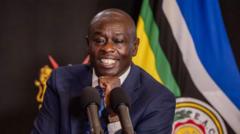The Kenyan Senate has commenced the impeachment trial against Deputy President Rigathi Gachagua, a pivotal moment in the nation's political landscape. The trial comes after a noteworthy fallout between Gachagua and President William Ruto, whose silence on the matter has fueled public intrigue. Gachagua, who faces 11 charges including corruption and undermining government efforts, denies all accusations.
The proceedings began with the Senate, having opted against forming an investigative committee, choosing instead to bring the charges before the full house. The trial spans two days, with opening statements and evidence presentations. On Wednesday, evidence against Gachagua will be presented for three hours, followed by two hours of cross-examination. Thursday will conclude the process with Gachagua's defense and a Senate vote possibly extending into Friday.
Notably, Gachagua's political career, marked by rapid ascension to the deputy presidency, faces jeopardy. A two-thirds Senate majority is required for his removal, barring him from any future public office. Gachagua plans to contest the decision legally if the impeachment passes.
Despite multiple court filings to halt the process and safeguard his political career, Kenyan courts have upheld the Senate's mandate. The charges against him include acquiring significant assets allegedly through corrupt practices, a claim he counters by attributing the assets to his late brother's estate.
As Gachagua's impeachment dominates public discourse, many Kenyans view the trial as a distraction from pressing economic issues like soaring living costs. This political saga adds a dramatic layer to ongoing social issues, following protests over tax hikes earlier this year. Gachagua's alleged role in undermining security agencies has further polarized public opinion.
With the nation closely monitoring the Senate's decision, Gachagua's fate remains uncertain, holding potential implications for Kenya's political future and governance.
The proceedings began with the Senate, having opted against forming an investigative committee, choosing instead to bring the charges before the full house. The trial spans two days, with opening statements and evidence presentations. On Wednesday, evidence against Gachagua will be presented for three hours, followed by two hours of cross-examination. Thursday will conclude the process with Gachagua's defense and a Senate vote possibly extending into Friday.
Notably, Gachagua's political career, marked by rapid ascension to the deputy presidency, faces jeopardy. A two-thirds Senate majority is required for his removal, barring him from any future public office. Gachagua plans to contest the decision legally if the impeachment passes.
Despite multiple court filings to halt the process and safeguard his political career, Kenyan courts have upheld the Senate's mandate. The charges against him include acquiring significant assets allegedly through corrupt practices, a claim he counters by attributing the assets to his late brother's estate.
As Gachagua's impeachment dominates public discourse, many Kenyans view the trial as a distraction from pressing economic issues like soaring living costs. This political saga adds a dramatic layer to ongoing social issues, following protests over tax hikes earlier this year. Gachagua's alleged role in undermining security agencies has further polarized public opinion.
With the nation closely monitoring the Senate's decision, Gachagua's fate remains uncertain, holding potential implications for Kenya's political future and governance.



















